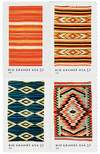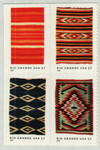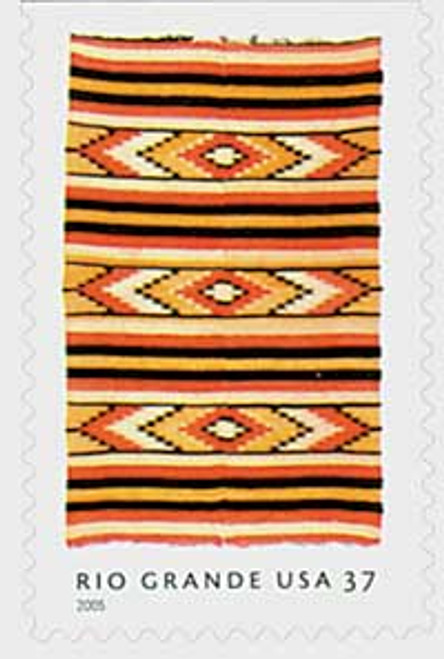
2005 37c Rio Grande Blankets
# 3926-29 - 2005 37c Rio Grande Blankets
$1.95 - $30.00
U.S. #3926-29
37¢ Rio Grande Blankets
Booklet Stamps
37¢ Rio Grande Blankets
Booklet Stamps
Issue Date: July 30, 2005
City: Santa Fe, NM
Printing Method: Lithographed
Color: Multicolored
City: Santa Fe, NM
Printing Method: Lithographed
Color: Multicolored
The Spaniards brought Andalusian churro sheep, indigo dye, and the horizontal-bed treadle loom to the Americas. Colonists, led by Juan de Oñate, brought three or four thousand churro sheep with them when they arrived at the Rio Grande River basin in 1598.
At first, Spanish-American Rio Grande settlers wove only the cloth they needed in this isolated new home. Later, they developed trade with Mexico and the Americans. In 1840, records show that tens of thousands of weavings were traded out of New Mexico. The item in greatest demand was the Rio Grande blanket.
Pueblo and Navajo Indians wove blankets on upright frames, but the Spanish settlers wove theirs on the European-style horizontal floor loom that was familiar to them. The width of this loom was narrower than a blanket, however. In order to achieve blanket width, matching pieces were sewn together side-by-side, or two layers, joined at one edge, were woven on the loom.
In Rio Grande blankets, the weft, the yarn across the width of the fabric, carries the visible pattern. The warp, the yarn running the length of the blanket, shows only at the ends. The designs, as seen on the Rio Grande Blankets stamps, were mainly stripes and diamond motifs copied from the weavings of Saltillo, Mexico.
U.S. #3926-29
37¢ Rio Grande Blankets
Booklet Stamps
37¢ Rio Grande Blankets
Booklet Stamps
Issue Date: July 30, 2005
City: Santa Fe, NM
Printing Method: Lithographed
Color: Multicolored
City: Santa Fe, NM
Printing Method: Lithographed
Color: Multicolored
The Spaniards brought Andalusian churro sheep, indigo dye, and the horizontal-bed treadle loom to the Americas. Colonists, led by Juan de Oñate, brought three or four thousand churro sheep with them when they arrived at the Rio Grande River basin in 1598.
At first, Spanish-American Rio Grande settlers wove only the cloth they needed in this isolated new home. Later, they developed trade with Mexico and the Americans. In 1840, records show that tens of thousands of weavings were traded out of New Mexico. The item in greatest demand was the Rio Grande blanket.
Pueblo and Navajo Indians wove blankets on upright frames, but the Spanish settlers wove theirs on the European-style horizontal floor loom that was familiar to them. The width of this loom was narrower than a blanket, however. In order to achieve blanket width, matching pieces were sewn together side-by-side, or two layers, joined at one edge, were woven on the loom.
In Rio Grande blankets, the weft, the yarn across the width of the fabric, carries the visible pattern. The warp, the yarn running the length of the blanket, shows only at the ends. The designs, as seen on the Rio Grande Blankets stamps, were mainly stripes and diamond motifs copied from the weavings of Saltillo, Mexico.













